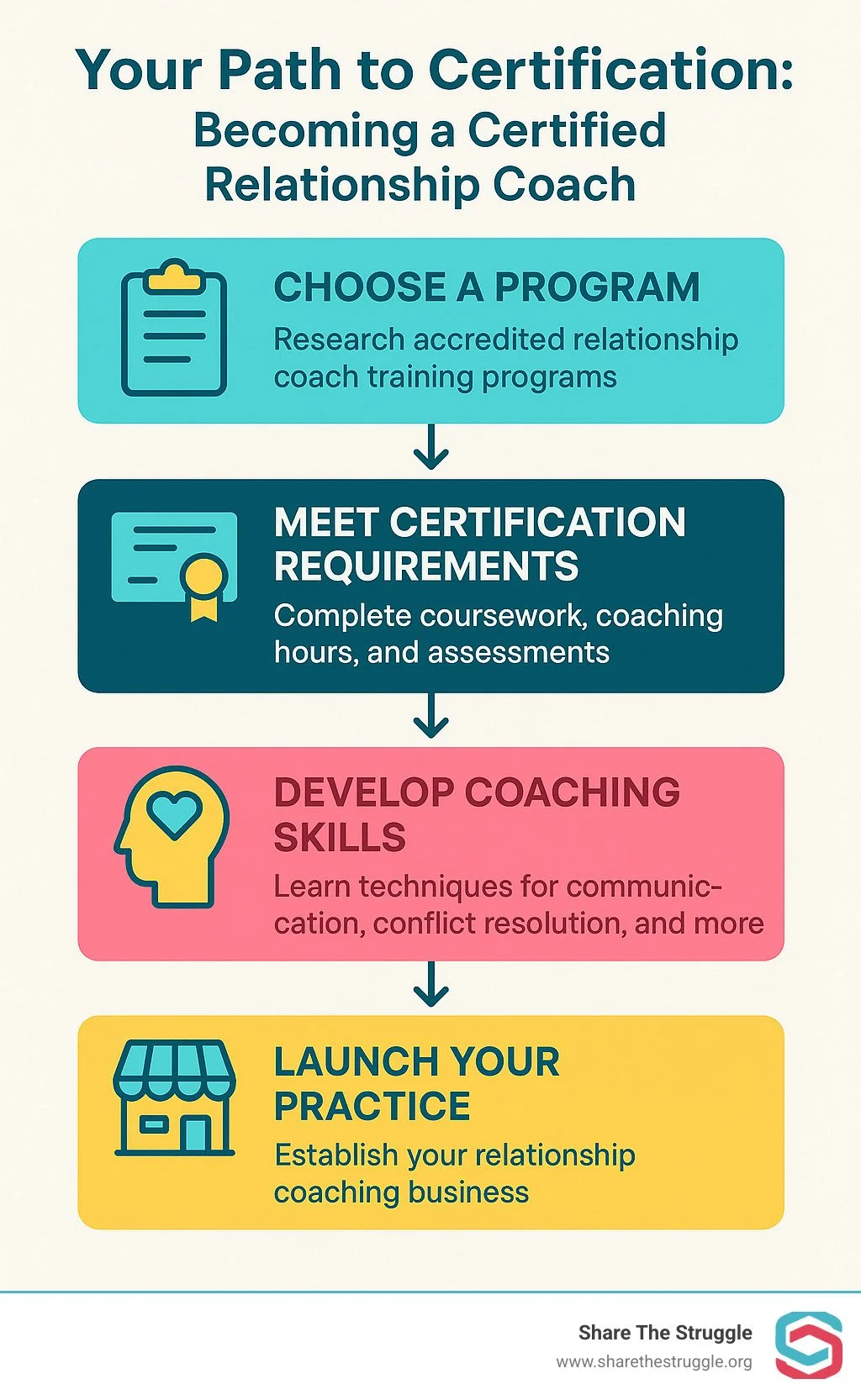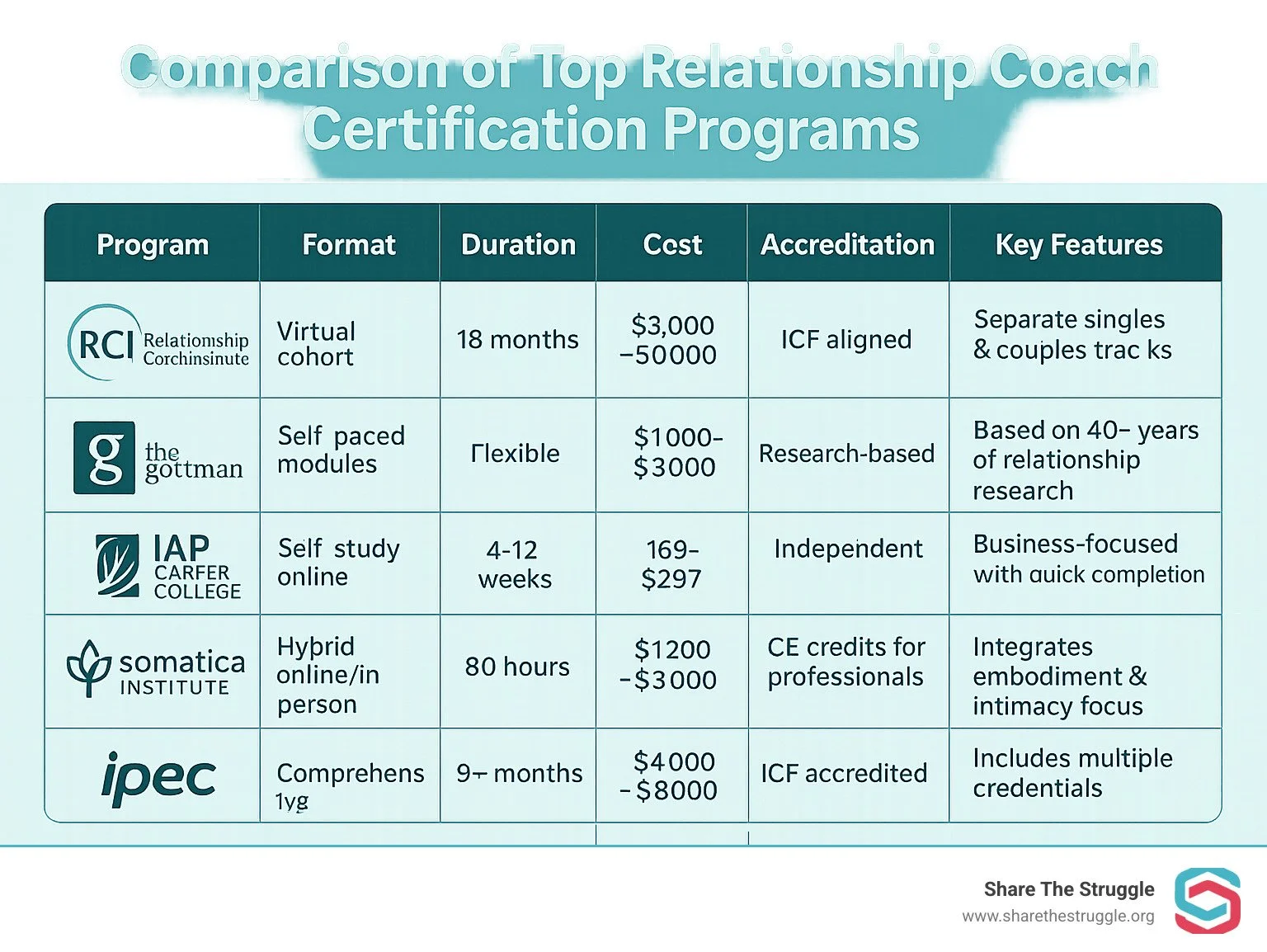Your Path to Certification: Becoming a Certified Relationship Coach
The Growing Demand for Relationship Coach Certification
Relationship coach certification is a professional credential that equips you to help individuals and couples improve their connections, communication, and relationship satisfaction. For those seeking a clear path to certification, here's what you need to know:
Certification Essentials Details Prerequisites Most programs require no prior experience Program Duration 6 weeks to 9 months depending on format Cost Range $39 (basic) to $4,000+ (comprehensive) Career Potential $75-$250/hour after certification Top Programs ICF, Gottman Institute, RCI, Somatica, iPEC
Have you ever wondered why some relationships thrive while others struggle? This question drives thousands of people to seek relationship coaches every year. The demand for qualified relationship coaches is booming, creating opportunities for those passionate about helping others build healthier connections.
"Coaching is a powerful way to empower and help people have the life they want and is a fulfilling career for the coach," notes one industry leader. This dual benefit—helping others while developing a rewarding career—makes relationship coaching certification increasingly attractive.
Unlike therapy, which often focuses on past trauma, relationship coaching is forward-looking and solution-oriented. Coaches help clients develop practical skills and actionable plans to transform their relationships. This practical approach resonates with many clients seeking immediate improvement in their connections.
For Christians seeking to integrate faith into their coaching practice, relationship coaching offers a meaningful way to serve others through Biblical principles of love, communication, and commitment.
Whether you're looking to transition careers, add a specialty to your existing practice, or simply improve your own relationships, relationship coach certification provides structured training in the art and science of building healthy connections.
What Does a Relationship Coach Do?
Relationship coaches are architects of human connection. They help clients build stronger, healthier relationships by focusing on present challenges and future goals rather than past wounds. While therapists often dive deep into historical trauma, relationship coach certification programs train coaches to work with clients on building practical skills and implementing actionable strategies.
"Intimacy is not something that just happens between two people; it is a way of being alive," explains one certification program. This perspective shapes how relationship coaches approach their work—as facilitators of growth and connection rather than healers of past trauma.
A certified relationship coach helps clients establish healthy boundaries in their relationships, develop effective communication skills to reduce conflict, and create shared visions for their future together. They guide people through important transitions like dating, marriage, or divorce, while strengthening intimacy and trust. Many coaches also help improve family dynamics and apply relationship skills in workplace settings.
At Share The Struggle, we understand that relationship challenges often intersect with emotional and mental health needs. Our captive thoughts coaching model helps clients identify and transform negative thought patterns that may be sabotaging their relationships, bringing them into alignment with biblical principles.
Main Coaching Niches
When you pursue relationship coach certification, you'll find several specialized areas where you can make a meaningful difference:
Marriage Coaching helps couples strengthen their bond and steer challenges like financial disagreements or parenting differences. Dating Coaching guides singles through mindful dating practices, helping them clarify what they truly want in a partner. Family Coaching works with parents and children to create more harmonious home environments through better communication.
Intimacy Coaching supports couples in deepening both physical and emotional connection, while Business Relationship Coaching helps workplace teams resolve conflicts and collaborate more effectively. For those going through separation, Divorce Recovery Coaching offers guidance through emotional healing and establishing new life patterns.
Many Christians find their calling in Faith-Based Relationship Coaching, where they integrate spiritual principles into relationship guidance. This approach helps clients align their relationships with their faith values, creating connections that honor God's design for human relationships.
According to industry research, "Relationship coaching addresses both personal and professional relational dynamics." This versatility allows coaches to transfer skills across different contexts and client needs, making it a truly adaptable career path.
Benefits of the Role
Becoming a certified relationship coach offers rewards that go far beyond financial compensation.
First, there's the deep satisfaction of purpose-driven work. Helping others transform their relationships brings meaning to your days. As one coach shared, "This training completely changed the dynamics of those relationships. There are literally no regrets."
You'll also enjoy remarkable flexibility and freedom in how you structure your practice. Many coaches work both in-person and online, setting their own hours and creating a lifestyle that works for them. "Are you inspired by a life of freedom and flexibility?" asks one certification program—and for many coaches, this freedom is a key benefit.
The scalable income potential is another attractive aspect. Most relationship coaches charge between $75 and $250 per hour, with experienced coaches earning at the higher end. Many also create additional revenue through workshops or group coaching sessions.
Perhaps most surprisingly, coaches experience tremendous personal growth through their training. "My relationship with myself has improved with better boundaries and self-awareness," shared one coach. The skills you learn to help others often transform your own relationships too!
At Share The Struggle, our coaches experience the added benefit of integrating faith principles into their practice. They help clients address relationship challenges through a biblical lens while earning between $180-$400 per month depending on the coaching package they offer—from weekly group sessions at $40/month to couples coaching at $400/month.
If you're feeling called to help others build healthier relationships while growing personally and professionally, relationship coaching might be your perfect path forward.
Navigating Relationship Coach Certification
Finding your way through the maze of relationship coach certification options can feel a bit like dating – there are plenty of fish in the sea, but which one is right for you? Let's break down this journey into manageable steps so you can make a choice that aligns with your heart and goals.
Prerequisites and Requirements
One of the most beautiful things about becoming a relationship coach is that the door is wide open to almost anyone with passion. Unlike many professions that require years of specialized education, most certification programs are structured with no prior experience necessary. This welcoming approach makes relationship coaching perfect for career-changers, empty-nesters, or anyone with a heart for helping others.
While formal requirements are minimal, the best relationship coaches typically bring natural gifts to the table – genuine empathy, good listening skills, emotional intelligence, and often their own relationship lessons (both the beautiful and the messy ones). These lived experiences often become the fertile soil where coaching expertise can grow.
If you're coming from a faith perspective, your spiritual foundation can be a tremendous asset. At Share The Struggle, we've seen how personal faith journeys often enrich a coach's ability to connect with clients seeking relationship guidance that honors their spiritual values.
Regulation and Standards
Here's something important to understand: coaching is not regulated in the USA; no official license is required. This creates both freedom and responsibility in choosing quality training.
The International Coaching Federation (ICF) has emerged as the gold standard in the coaching world. Programs that align with ICF competencies and ethics have undergone rigorous review, giving you additional credibility without being legally required.
Think of ICF standards as guardrails that keep your coaching practice on the road to excellence, covering everything from establishing clear agreements with clients to maintaining confidentiality and professional boundaries.
(For a broad, research-based look at relationship health, you can explore the American Psychological Association's resources on relationships at apa.org.)
Program Formats
Life is busy, and your learning style is unique – thankfully, relationship coach certification programs come in several flavors to match your needs:
Self-Paced Online programs offer maximum flexibility for parents, full-time workers, or night owls who do their best learning at 2 AM. Programs like IAP Career College let you complete certification "in six weeks (flexible from four to twelve weeks)" on your own schedule.
Cohort-Based programs like The Relationship School offer "a nine-month cohort model versus five-day workshop." These create a community journey where you learn alongside peers, practice together, and form professional connections that often last well beyond certification.
Hybrid Approaches blend independent study with live components – perhaps weekly videos you watch on your own time paired with monthly live coaching calls. This gives you both structure and flexibility.
At Share The Struggle, we understand that learning to coach effectively, especially when integrating faith principles, benefits from both solid training materials and supportive community. This combination helps coaches develop the confidence to guide clients through relationship challenges using frameworks like our captive thoughts coaching model.
Types of Relationship Coach Certification Paths
Your path to becoming a certified relationship coach should fit your learning preferences, schedule, and professional goals. Here's what's available:
Comprehensive Cohort Programs (6-9 months) provide the most thorough training experience. These programs feel like getting a mini-degree in relationship dynamics, with weekly training, regular practice sessions, and mentor feedback. One leading program describes their approach as "a 6-month program with weekly training modules and live mentoring calls," preparing you to start taking clients immediately after graduation. These programs build both skills and confidence through consistent practice and feedback.
Weekend Intensives condense core concepts into several powerful days of training. These boot-camp style programs work well for learners who thrive in immersive environments and prefer to "rip off the Band-Aid" rather than spread learning over months. They're typically more affordable than longer programs but may require additional self-study to fully develop your coaching muscles.
Self-Study Certification gives you maximum control over your learning journey. As one program notes, "The Relationship Coach Certificate Course is a part-time online program with a recommended completion in six weeks (flexible from four to twelve weeks)." These programs work beautifully for self-motivated learners with busy or unpredictable schedules.
Hybrid Models combine elements from different formats, like self-paced videos paired with scheduled live workshops. This "best of both worlds" approach offers flexibility without sacrificing connection.
Partner-Included Programs offer an innovative twist: "The only Relationship Coach Certification taught by a thriving married couple... that invites your partner (optional) to get certified with you for FREE!" Imagine learning alongside your spouse and potentially launching a coaching practice together – what a powerful way to strengthen your own relationship while helping others!
For Christian coaches, training that integrates biblical wisdom with evidence-based coaching techniques provides a solid foundation. At Share The Struggle, our approach emphasizes helping clients identify and transform thought patterns that may be undermining their relationships, aligned with the biblical principle of taking thoughts captive.
Cost & ROI of Relationship Coach Certification
Let's talk dollars and sense. Investment in relationship coach certification varies dramatically across programs:
Basic self-study programs cost as little as $39-$300, making them accessible entry points if you're testing the waters or on a tight budget. One basic certification proudly advertises: "ENROLL NOW FOR JUST $39! (ONE-TIME PAYMENT)."
Mid-range certification programs ($500-$2,000) typically offer more structured curriculum and some level of instructor interaction or feedback.
Premium comprehensive programs ($3,000-$8,000) provide extensive training, mentorship, supervision, and often business development support. According to our research, "Most relationship coaching programs typically cost around $4,000."
What influences these price differences? Programs with live instruction, personal mentorship, ongoing supervision, and business development components naturally cost more than self-study options. Accreditation alignment and access to proprietary coaching tools also add value.
The potential return on your investment can be quite rewarding. Most relationship coaches charge an hourly rate dependent on experience, typically between $75 and $250 or more per hour. At these rates, you could recoup your certification investment within a few months of part-time coaching.
Many programs highlight the business potential with statements like: "Coaches see an average of 1-15 clients/week at $150-$200/hour, earning up to $75,000/year."
At Share The Struggle, our coaches typically charge between $180-$400 per month depending on session frequency and format. Weekly 25-minute one-on-one sessions (or bi-weekly 50-minute sessions) run $180/month, while weekly 50-minute individual coaching is $360/month and couples coaching is $400/month. This sustainable pricing model allows coaches to earn meaningful income while keeping services accessible to those who need relationship support.
Beyond financial returns, the personal growth many coaches experience often represents the most valuable dividend from their certification investment. As one coach shared, "The skills I learned transformed my own marriage before I ever worked with my first client."
Comparing Top Certification Programs
Choosing the right relationship coach certification can feel like finding the perfect partner—you want alignment in values, approach, and long-term goals. Let's take an honest look at five leading programs that relationship coaches-in-training often consider (listed here without promotional links so you can research them further on your own):
Relationship Coaching Institute (RCI) offers a comprehensive virtual cohort experience spanning 18 months with an investment of roughly $3,000-$5,000. What makes RCI distinctive is their community-centered approach—"RCI members are not mere students but invested members focused on long-term success." With 144 total training hours and separate tracks for singles and couples coaching, RCI provides specialized training that aligns with widely accepted coaching standards.
The Gottman Institute leverages more than four decades of relationship research. Their certification track focuses on specific relationship dynamics like the famous "Four Horsemen" of relationship breakdown. With flexible, self-paced modules ranging from about $1,000-$3,000, Gottman certification carries significant credibility in the field.
IAP Career College offers a budget-friendly option at just $169-$297. Designed to be completed in as little as 4-12 weeks, IAP emphasizes practical business skills to get your practice launched quickly.
Somatica Institute brings something unique to the table with a body-centered approach. Their 80-hour hybrid program ($1,200-$3,000) appeals to coaches interested in integrating physical awareness into their practice. Health professionals may appreciate that it includes continuing-education credits.
iPEC delivers a comprehensive experience over nine or more months at $4,000-$8,000. Their program is known for producing multi-credentialed coaches who can serve individuals, couples, and groups across many niches.
At Share The Struggle, while we don't offer certification ourselves, we partner with coaches who bring diverse training backgrounds and integrate our faith-based captive thoughts model. This approach helps clients identify and transform thought patterns that may be undermining their relationships, aligning with the biblical principle of taking thoughts captive (2 Corinthians 10:5).
When evaluating programs, consider not just the cost and duration, but also the philosophy and approach. The right certification should resonate with your personal values and the way you hope to serve your future clients. For Christians seeking to integrate faith into their coaching practice, finding a program that allows space for biblical principles can be particularly meaningful.
Support & Mentoring During and After Certification
Quality relationship coach certification programs recognize that learning continues beyond formal training. The level of support during and after certification can significantly impact your development and success.
During Certification:
Peer Cohorts: Many programs create supportive learning communities. "My experience was beyond what I expected... Not only do you get all these amazing tools but also a community of people who are like-minded and all invested in growing along with you," shared one graduate.
Supervision Calls: Regular feedback from experienced coaches accelerates learning. One program highlights "LIVE Mentoring Calls with instructors" as a core component, while another offers "Group Supervision Calls" throughout training.
Practice Partners: Structured peer practice opportunities help integrate skills. "Practice Calls" and "Buddy Coaching" systems allow students to apply techniques in low-pressure environments before working with paying clients.
After Certification:
Lifetime Materials Access: Many programs provide ongoing resource access: "Relationship coach certification programs often include lifetime access to course materials and client handouts, supporting ongoing professional development."
Alumni Communities: Continued connection with fellow graduates provides support and referral networks. Private online communities and regular alumni events maintain these valuable relationships.
Business Bootcamps: Some programs include dedicated business development components. "Business Bootcamp" modules help graduates translate their coaching skills into sustainable practices.
Continuing Education: Advanced training opportunities allow coaches to expand their skills. "Eligible for Certification" pathways often include continuing education requirements that ensure coaches stay current with best practices.
The Relationship School notes: "Traditional coach training schools leave you on your own; we remain invested in your success." This ongoing support philosophy is increasingly common among premium certification programs.
At Share The Struggle, we understand the importance of continued support and community for Christian coaches. While we don't offer certification ourselves, we provide ongoing resources and community connections for coaches who share our faith-based approach to relationship wellness.
Real-World Practice & Tools
Effective relationship coach certification programs balance theoretical knowledge with practical application. The tools and practice opportunities provided can significantly impact your confidence and effectiveness as a coach.
Evidence-Based Tools:
Many programs provide extensive toolkits for graduates. One leading certification boasts "50+ scientifically backed, proven, and powerful tools to help couples create massive breakthroughs and transform their love."
These tools typically include:
Assessment frameworks to identify relationship patterns
Structured conversation guides for difficult topics
Conflict resolution worksheets and protocols
Communication improvement exercises
Intimacy-building activities
Goal-setting and visioning templates
Homework assignments for clients between sessions
Practice Methodologies:
Real-world skill development occurs through various practice formats:
Role-Plays: Simulated coaching scenarios help develop core skills. "The three-part weekly class format: discussion, demonstration, and practice with reflection" allows coaches to try techniques in controlled environments.
Recorded Sessions: Some programs provide "Rare Opportunity to Watch Real Sessions" where instructors demonstrate techniques with actual clients.
Practicum Requirements: Many certifications require documented practice hours. "Log 10 hours of practice coaching sessions with peers" or "accumulate the required coaching hours" before certification.
Specialized Approaches:
Different programs emphasize unique methodologies:
Somatic Methods: Body-centered approaches recognize that "Intimacy is not just emotional but a holistic, embodied experience." These techniques help clients access wisdom beyond cognitive understanding.
Attachment Maps: Understanding attachment styles helps coaches address relationship patterns. "Apply attachment mapping and conflict-repair cycles in sessions" to identify deeper dynamics.
Present-Centered Coaching: Some programs teach coaches to focus on the present moment: "Present Centered Relationship Coaching™ resolves client ruptures within the first 60-minute session."
At Share The Struggle, our captive thoughts coaching model provides Christian coaches with powerful tools to help clients identify and transform thought patterns that may be undermining their relationships. This approach aligns with the biblical principle of taking thoughts captive (2 Corinthians 10:5) and applies it to relationship challenges.
Building Skills, Practice & Business
Earning your relationship coach certification is an exciting milestone, but it's just the beginning of your journey. The real magic happens when you transform that knowledge into a thriving practice that serves others while supporting your own life and goals.
Think of your coaching development as a three-legged stool—you need strong skills, solid business foundations, and effective marketing strategies for stability and growth. Let's explore how to build each of these essential elements.
Core Coaching Skills
The heart of effective relationship coaching lies in your ability to connect with clients and facilitate meaningful change. While your certification program provided the basics, mastering these core skills takes practice and intentionality:
Powerful Questioning transforms coaching conversations from casual chats into transformative experiences. As one veteran coach explains, "Coaching is more than asking one question at a time—it's developing a strategic series of questions that guide clients toward their own insights." When you ask the right question at the right moment, you create space for breakthrough realizations.
Active Listening goes far beyond hearing words. Great coaches tune into emotions, values, and patterns that clients themselves might miss. You're listening for what's said and unsaid, creating a space where clients feel truly understood, perhaps for the first time in their lives.
Conflict Repair skills help couples and individuals steer disagreements constructively. Whether you're helping co-parents communicate after divorce or supporting a couple through recurring arguments, your ability to guide clients through tension toward resolution is invaluable.
Boundary Setting is both a skill you teach and one you model. Healthy relationships require clear boundaries, and many clients struggle to establish and maintain them. Your own clear professional boundaries also demonstrate what healthy limits look like in practice.
Emotional Intelligence enables coaches to recognize, understand, and work effectively with emotions—both their clients' and their own. Tools like the LUFU (Listen, Understand, Feel, Use) approach help coaches guide clients through emotional regulation while modeling these skills themselves.
Business Fundamentals
Turning your passion and certification into a sustainable business requires attention to practical details that many creative, people-oriented coaches might prefer to skip. But these foundations are essential:
Legal Structure decisions impact your taxes, liability, and business operations. Many coaches start as sole proprietors for simplicity, then transition to an LLC as their practice grows. Research the options in your location to make an informed choice.
Coaching Agreements protect both you and your clients by clearly outlining expectations, boundaries, and policies. Most certification programs provide templates you can customize to fit your practice. Don't skip this step—clear agreements prevent misunderstandings and create professional credibility.
Insurance Considerations might seem unnecessary for "just talking" with clients, but professional liability insurance protects your practice and peace of mind. As your business grows, you might also consider other coverage types.
Financial Systems need to be established early. How will you accept payments? What accounting software will you use? Will you offer packages or hourly rates? Most coaches charge between $60-$150 per hour initially, but rates vary widely based on specialization, experience, and location.
Digital Presence is essential in today's coaching marketplace. A professional website and thoughtful social media presence help potential clients find you and understand your unique approach. You don't need anything fancy to start—clarity and authenticity matter more than perfect design.
At Share The Struggle, our coaches offer various pricing options to serve different needs, from $40/month group coaching to $400/month couples coaching. This range allows coaches to build sustainable practices while keeping services accessible.
Marketing Your Coaching Practice
Even the most skilled coach needs clients to create impact. Building your client base requires intentional marketing that feels authentic to you and resonates with those you're meant to serve.
Niche Definition transforms you from a generic "relationship coach" to a specialist who solves specific problems for specific people. Rather than trying to help everyone with everything, consider focusing statements like: "I help career-minded individuals build partnerships that support their ambitions" or "I guide empty-nesters in refinding connection after raising children."
For Christian coaches, your faith perspective can become part of your niche: "I support Christian couples in aligning their relationships with biblical principles." This clarity helps the right clients find you and immediately understand how you can help them.
Content Creation allows you to share your expertise while attracting potential clients. Whether you write blog posts, record videos, or speak on podcasts, valuable content demonstrates your knowledge and approach. Focus on addressing the questions and challenges your ideal clients face.
Networking with complementary professionals creates referral partnerships that benefit everyone. Build relationships with therapists, faith leaders, wedding professionals, or divorce attorneys who serve similar clients but offer different services. These connections often become your most consistent client sources.
Speaking Opportunities at local organizations, churches, or community centers help you reach potential clients while serving your community. These events allow people to experience your approach firsthand, often leading to private coaching relationships.
Social Media Strategy doesn't mean being everywhere all the time. Choose 1-2 platforms where your ideal clients gather and share valuable content consistently. Authentic engagement matters more than perfect production value or massive follower counts.
Launching Your Coaching Practice
The transition from certification to active practice involves several key decisions that shape your coaching business:
Niche Statement Development clarifies exactly who you serve and how you help them. Your relationship coach certification likely covered this concept, but refining your niche statement takes time and often evolves as you work with clients. The most effective statements speak directly to your ideal client's pain points and desires.
Pricing and Packages reflect both your value and your market. While research shows most relationship coaches charge between $75-$250 hourly, many find package pricing creates better results and more stable income. Consider offering options like weekly sessions for couples at $400/month or bi-weekly individual sessions at $180/month, adjusting based on your market and experience level.
Legal and Business Basics might not be exciting, but they're essential foundations. Set up your business name, bank account, client agreements, scheduling system, and payment processing before accepting clients. Many certification programs include business setup modules to guide you through these steps.
Insurance Considerations protect your practice from potential claims. While coaching generally carries lower risk than therapy, professional liability insurance provides peace of mind and demonstrates your commitment to professional standards.
Building Referral Networks often generates more consistent clients than advertising. Develop relationships with professionals who serve similar clients but offer different services. These connections become mutually beneficial as you refer clients to each other based on specific needs.
At Share The Struggle, we connect certified coaches with clients seeking faith-based relationship support. Our captive thoughts coaching model provides a unique framework for addressing relationship challenges through biblical principles, creating a natural bridge between faith and practical relationship skills.
Continuing Education & Specializations
The relationship coaching field continues evolving, and ongoing learning improves both your effectiveness and marketability. After completing your initial relationship coach certification, consider these specialization paths:
Sex Coaching Integration allows you to address intimacy concerns that frequently arise in relationship work. Programs like Somatica offer training that prepares coaches to address both emotional and physical aspects of relationships, addressing a common gap in many couples' support needs.
Trauma-Informed Approaches equip you to recognize when past experiences might be impacting current relationships. While coaches don't provide trauma therapy, understanding how trauma manifests in relationships helps you serve clients appropriately and make referrals when necessary.
Bereavement Coaching specialization serves clients navigating loss, which profoundly impacts relationships. Some programs offer dual certification in relationship and grief coaching, preparing you to support clients through these challenging transitions.
Christian Life Coaching integration allows faith-oriented coaches to incorporate biblical principles into their work. At Share The Struggle, our captive thoughts model helps clients identify and transform thought patterns that undermine relationships, aligning with the biblical principle of taking thoughts captive (2 Corinthians 10:5).
Investing in continued learning not only maintains your credentials but also keeps your practice fresh and engaging. The most successful coaches view learning as a lifelong journey, continuously expanding their toolkits to better serve their clients' evolving needs.
Frequently Asked Questions about Relationship Coach Certification
What qualifications do I need to enroll?
Wondering if you're qualified to pursue relationship coach certification? Good news - this field welcomes people from diverse backgrounds! Most certification programs have minimal barriers to entry, making this an accessible career path for many.
"Most certification programs are structured with no prior experience necessary," our research shows. This open-door approach is intentional, allowing career-changers and newcomers to enter the helping professions without years of prerequisite education.
While formal qualifications aren't typically required, successful coaching students often bring natural strengths like genuine empathy, good listening skills, and their own relationship experiences (both the struggles and victories). A growth mindset is essential too - being willing to examine your own relationship patterns as you learn to help others with theirs.
One program puts it plainly: "There are NO prerequisites; anyone can apply." That said, some advanced or specialized programs might expect prior coach training or relevant professional experience before enrollment.
For those interested in faith-based coaching like what we offer at Share The Struggle, programs may look for familiarity with biblical principles and alignment with Christian values - but formal religious credentials are rarely required.
How long before I can start taking clients?
The journey from student to practicing coach varies depending on your training path, but most programs create clear milestones toward working with paying clients.
Many comprehensive programs actually encourage you to start practicing with non-paying clients (often friends or fellow students) during your training. This supervised practice helps build confidence while you're still in a supportive learning environment. "Begin coaching clients early to develop skills through practice" is advice we hear consistently from successful programs.
Some certification paths prepare you to hit the ground running: "Preparing graduates to start taking clients immediately after completion." Others might recommend additional practice hours before charging for your services.
Beyond formal requirements, your personal confidence matters enormously. Many new coaches tell us that supervised practice sessions with detailed feedback were the turning point in feeling ready to work with paying clients.
At Share The Struggle, we believe becoming a confident coach involves both technical skill-building and personal growth. Our coaches develop both professional competence and the heart behind the work, especially when integrating faith perspectives into their practice.
Is accreditation like ICF absolutely necessary?
The question of whether to pursue ICF (International Coaching Federation) accreditation often creates confusion for new coaches. Let me break down the perspectives:
On one hand, ICF accreditation represents a gold standard in the industry. "For a coach training program to be ICF-accredited, they must undergo a rigorous review process and demonstrate that its curriculum aligns with the ICF definition of coaching, Core Competencies, and Code of Ethics." This thorough vetting ensures quality training and ethical guidelines.
On the other hand, "The coaching industry in the USA is unregulated, and there is no formal licensing." Some successful programs point out that "ICF accreditation is not legally required; clients focus more on your certification title and training" and "Over 95% of clients have never heard of the ICF."
The most balanced view recognizes that while ICF credentials aren't mandatory, they can significantly boost your credibility - especially when working with corporate clients or building referral relationships with therapists and other professionals.
For Christian coaches, alignment with faith values often matters just as much as secular credentials. At Share The Struggle, we value both professional standards and biblical integrity, believing effective coaching requires both skill and heart.
Your decision about pursuing ICF-accredited training should align with your specific goals, target market, and long-term vision. Some coaches find the structure and recognition valuable, while others prioritize specialized training that may not carry ICF approval but perfectly suits their niche.
If you're interested in exploring coaching as a client rather than becoming a coach yourself, Share The Struggle offers several coaching packages to support your relationship journey. Our weekly group sessions start at just $40/month, while one-on-one coaching ranges from $180-$360/month depending on session length and frequency. For couples seeking faith-integrated relationship support, our couples coaching is available at $400/month.
Conclusion
Starting on the path to relationship coach certification opens the door to a truly meaningful career that makes a real difference in people's lives. Throughout this guide, we've walked together through the essential steps of becoming a relationship coach – from selecting the right training program to developing core skills and building a thriving practice that reflects your unique gifts.
What makes relationship coaching so special is its remarkable flexibility. Whether you learn best in a supportive cohort environment or prefer the freedom of self-paced study, there's a certification pathway that will feel just right for your learning style and life circumstances. The range of options is equally flexible for your budget – from accessible $39 self-study programs to comprehensive $8,000 immersive experiences, with plenty of middle-ground options that balance depth with affordability.
For those of us with faith at the center of our lives, relationship coaching offers a beautiful opportunity to serve others through biblical principles of love, communication, and commitment. At Share The Struggle, our captive thoughts coaching model helps clients identify and transform negative thinking patterns that undermine their relationships, gently bringing them into alignment with Scripture's wisdom. This faith-integrated approach creates space for both practical skill-building and spiritual growth.
The growing demand for qualified relationship coaches reflects a deeper truth – we're witnessing a cultural shift toward valuing relationship health and investing in connection. With potential earnings between $75-$250 per hour, this career path offers the rare combination of meaningful work and financial sustainability. What could be more fulfilling than helping others create healthier, more vibrant relationships while supporting yourself and your family?
If you feel that gentle tug toward helping others nurture their most important connections, I encourage you to take the next step in your certification journey. Find a program that resonates with your values, accommodates your learning preferences, and fits your financial situation. Consider how your unique life experiences, strengths and perspectives might enrich your coaching practice in ways no one else can offer.
For those who are seeking relationship support rather than certification, Share The Struggle offers several warm, accessible coaching options:
Weekly 1-hour group sessions (max of 8 people) for $40/month
Weekly 25-minute 1-on-1 coaching (or bi-weekly 50-minute sessions) for $180/month
Weekly 50-minute 1-on-1 coaching for $360/month
Weekly 50-minute couples coaching for $400/month
Our certified coaches, based in Carlsbad, CA and serving clients nationwide through virtual sessions, thoughtfully blend faith perspectives with evidence-based techniques to support lasting relationship growth.
Whether you're considering becoming a relationship coach or seeking support for your own relationships, healthy connections are fundamental to human flourishing. By investing in relationship skills—either as a coach or as someone on a growth journey—you're contributing to a world where people communicate more clearly, connect more deeply, and experience more joy in their relationships.







